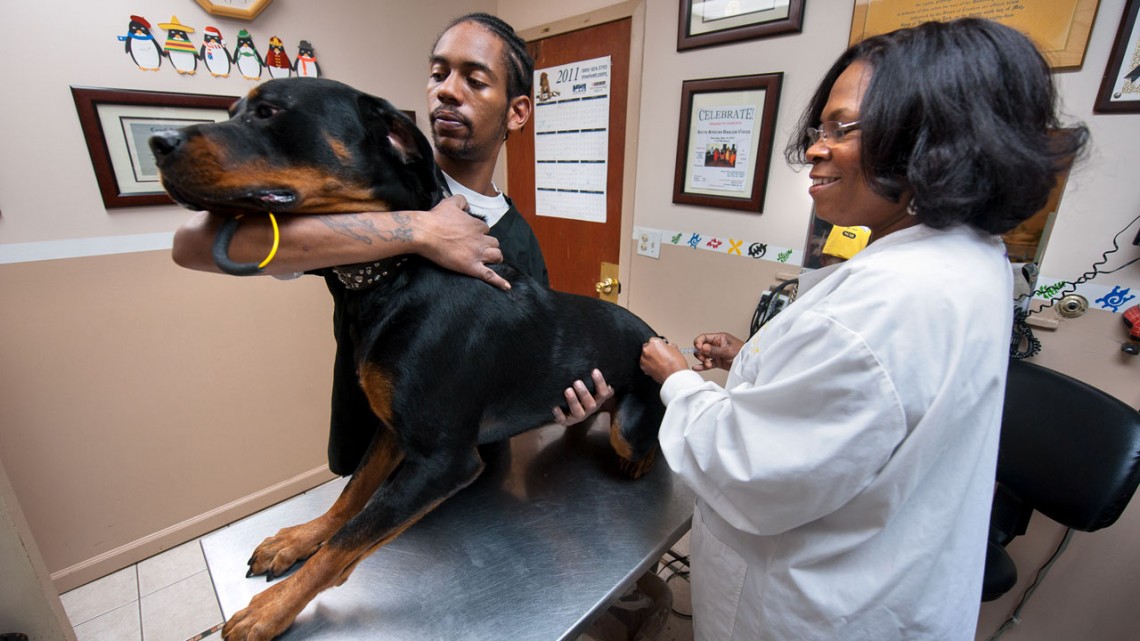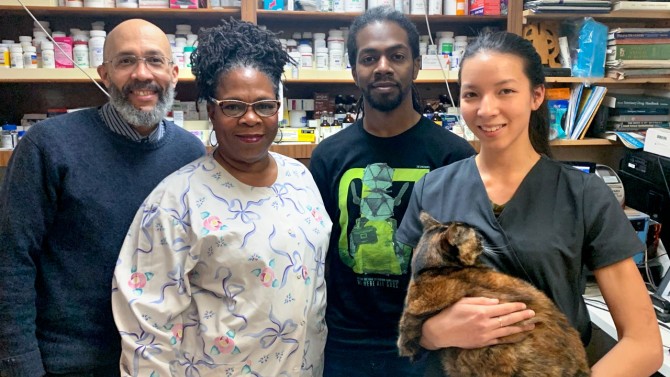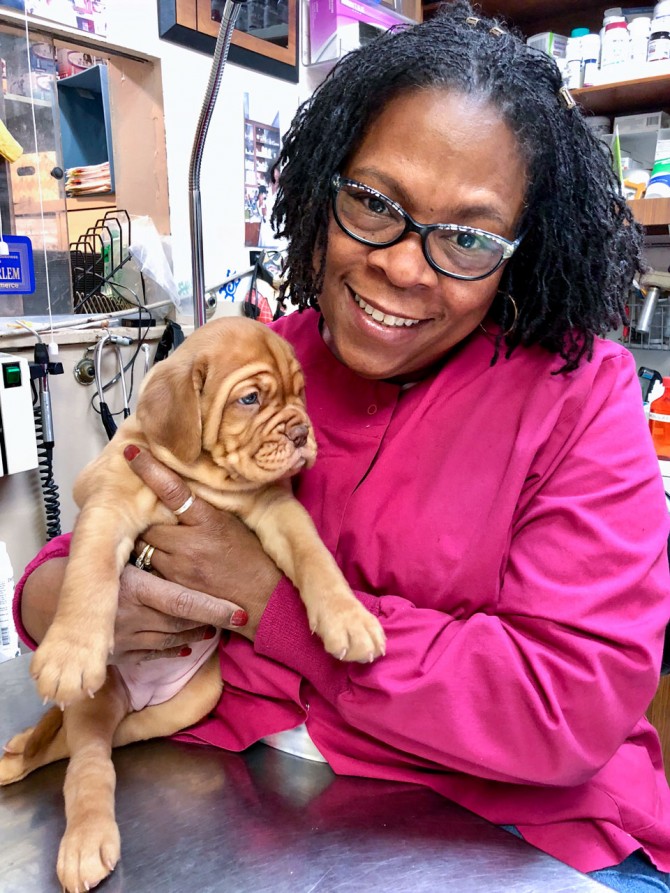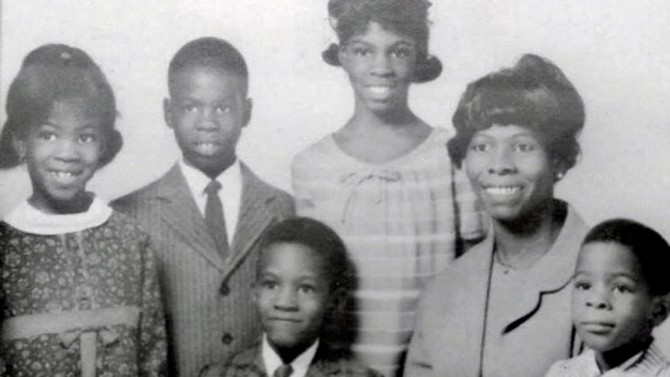
Dr. Julie Butler, D.V.M. ’83, administers a shot to a dog in 2011 as her assistant, Nikolas Toledo, helps her at the 145th Street Animal Hospital in Harlem.
COVID-19 takes the life of a Harlem veterinarian
By Lauren Cahoon Roberts
A large awning with twinkling lights welcomed visitors to the 145th Street Animal Hospital in Harlem, New York. Original art, photos and thank-you cards dotted the waiting room walls. The front desk sported stacks of local business cards and homemade goods from grateful clients – kale chips or homespun angora wool. “It was a community space where everyone was welcome,” says Anne Williams-Isom, a longtime client, “and you knew you were going to get top-notch care.”
That care came from Dr. Julie R. Butler, D.V.M. ’83, the owner of the practice, who devoted her time and talent to her neighborhood. Butler, educated in both art and science, was a musician, chef, dancer, singer, a founder and leader of local nonprofits, a mother and mentor who guided young people to become their best selves, just as she guided her clients to be the best caretakers for their pets.
“She made sure to educate clients through every step of the process in order to help them become better pet owners,” says former veterinary assistant Kylie Lang. “She took her time with patients, making sure to get a detailed version of their history, inevitably gaining the animal’s trust and often starting a friendship with the client. Many can say that she was more than just a veterinarian and treated staff and clients like family and friends.”
On April 4, 2020, Butler died of COVID-19.
The loss has been felt in myriad ways – including the possibilities she modeled for young Black people, particularly Black girls. “She showed that you don’t have to have the support of society to go where you want to go; you just have to turn a deaf ear to all those people who say you can’t. And trust me, she got plenty of those messages in her career,” says her sister Dr. Sheila Butler. “She was fearless. It was, ‘I’m gonna do it, I can do it.’”
To commemorate Butler, the College of Veterinary Medicine (CVM) has established the Julie R. Butler, D.V.M. ’83, Memorial Scholarship. The idea came from Dr. Caroline Yancey, director of international programs at CVM, and was championed by Butler’s classmate Dr. Jay Baldwin, D.V.M. ’83. The scholarship will benefit a veterinary student with financial need, with preference given to Black and underrepresented students and those who plan to work in underserved communities or already have experience doing so.
“It’s Julie’s spirit coming full circle,” says Sheila Butler. “We were raised with the attitude that, if I’m given an opportunity, it’s my obligation to help somebody else along. It’s like Julie is here reaching down from heaven.”
Seeking knowledge
When Julie Butler arrived at Cornell, she was the only Black student in her class. It was difficult for her to build peer support. “Being part of a study group is important in veterinary school – and it was difficult for her to be accepted into study groups,” Sheila Butler says.
Butler’s friend Dr. Linda Bostick, a veterinarian in Smyrna, Georgia, recalls how Butler spoke about her time at Cornell as a challenge. “That’s an extremely common theme for minorities in veterinary education,” Bostick said. “These programs are rigorous to say the least – you can’t get through it alone – and that isolation made it all that much harder for Julie to matriculate.”
Butler got her first job working at the American Society for the Prevention of Cruelty to Animals’ Brooklyn clinic, working with Dr. Lila Miller, D.V.M. ’77. In 1989, she went on to start her own practice – the 145th Street Animal Hospital. Her clinical talent became common knowledge within the community and beyond.
At the time, and many times thereafter, it would be the only Black-owned veterinary practice in the region.
“She didn’t land where she did because she couldn’t go elsewhere,” Bostick says. “She stayed there because she was so committed to serving that community. And that comes from compassion – her compassion extended not only to the pets, but also to the people.”
Professional care, a personal touch
Butler’s knowledge of the veterinary field and quickness to adapt in emergency situations saved the lives of many pets, Lang says. “She was ambitious and wasn’t afraid of complicated cases or unruly animals that were turned away at other veterinary practices.”
For the first several years of running the practice, Butler and her family lived on the third and fourth floor of the building. She gave her patients her full attention, regardless of their owners’ finances. “Providing good medicine to some clients who have a more limited ability to pay requires some creativity and some trust,” Bostick says.
Beyond the exam room, Butler worked to improve the community’s access to care by founding NY Save Animals in Veterinary Emergency, a nonprofit that provides funds to owners of pets in need of emergency care. And she served on the board of directors for Lutheran Social Services of New York.
Says Bostick: “She was really respected in the community, absolutely beloved.”
Human connections
Butler’s role as a female veterinarian of color affected clients and the community as well. “Julie and I both became veterinarians at a time when it was not so common to be a female vet, less common to be a Black female vet,” Bostick says.
Williams-Isom recalls meeting Butler when she moved to Harlem as a young working mother. “When I walked into that veterinary hospital, and saw that she was a Black woman, I was floored,” Williams-Isom says. “I began taking my daughter with me when she was about 6 years old to see this African American doctor in the community. It meant more than you can imagine.”
Butler regularly visited local schools to talk about the veterinary profession and welcomed many young people to work as interns at her practice; many came from the Harlem Children’s Zone, a nonprofit that uses education to end generational poverty. “She gave Black people the ability to consider that field as something to pursue,” says Williams-Isom, CEO of the organization. “She gave young people … that exposure.”
The Julie R. Butler, D.V.M. ’83, Memorial Scholarship aims to multiply these powerful experiences, says Dr. Melanie Ragin, CVM’s assistant dean of inclusion and academic excellence.
“We recognize that to create a more inclusive profession, we need to grow the pipeline of diverse people coming to it,” Ragin says. “By supporting more veterinary students from diverse backgrounds, they will then be better equipped to go practice in diverse communities and serve as role models for young people who might be encouraged to follow that career path.”
A profound loss
As the COVID-19 pandemic began its deadly sweep across the country, Butler continued to see patients. In early March, she came down with symptoms of the virus. As her sister wrote in an essay in Salon, medical professionals dismissed and ignored Butler’s worsening condition – a common experience for Black Americans and other people of color. “It made me angry to see my sister denied testing and treatment when I saw white friends, colleagues and acquaintances get one or both almost immediately upon showing symptoms,” Sheila Butler wrote.
Butler died from the virus at age 62.
After her death, family members and staff worked to keep the 145th Street Animal Hospital running. When they couldn’t find a buyer, they had to close the practice on Dec. 31, 2020.
“In the wake of her passing we got thousands of notes and cards from clients telling us how she made them feel like family,” says Butler’s daughter, Zora Howard. “It’s been overwhelming to see the expanse, the reach, that she really had.”
“She was the Harlem vet,” Bostick says. “It’s a loss.”
The scholarship: to inspire and improve
As the reverberations of Butler’s death echoed throughout Harlem, New York City and the nation, many of her fellow Cornellians were grappling with the fact that this remarkable classmate had faced isolation and discrimination while learning alongside them.
“None of us within our small study group knew Julie well,” says Baldwin. “But Dr. Butler’s death came as a real shock to our group … . Over the following 30 days we learned more about how much Dr. Butler had done for her community, and particularly how much she had done to mentor students interested in veterinary medicine.”
Yancey, CVM’s director of international programs, had heard about Butler’s death as well as her impact as a veterinarian and community leader from Baldwin. “When the Black Lives Matter movement and discussions of race and diversity increased later in the year, I thought again about Dr. Butler, and her excellent contributions to her community and the veterinary profession,” Yancey says.
“Scholarships like the one honoring Dr. Butler are vitally important,” says Dr. Lorin D. Warnick, Ph.D. ’94, the Austin O. Hooey Dean of Veterinary Medicine. “We must welcome and inspire people from all backgrounds to join this profession. We are very sorry for her untimely passing in such difficult circumstances and for this terrible loss for her family, friends, community and veterinary medicine.”
Bostick notes how in the past, universities would admit underrepresented students, fail to provide them with support and then point to students’ struggle as proof that they were unqualified. “So that change has to come from the top down,” says Bostick.
The college is dedicated to honoring the wishes of Butler’s family and friends, Ragin says.
“We recognize how important meaningful support is for our underrepresented students,” she says. “Together with other CVM leadership, we are designing a comprehensive, wrap-around enrichment program that provides these veterinary students with transformative academic, social and holistic well-being support to ensure every student feels welcome, supported and seen.”
Donations to the Julie R. Butler, D.V.M.’83, Memorial Scholarship can be made online. Questions about the fund or donating can be directed to Alison Rose Smith, director of development.
This article is adapted from the original, “Remembering a Renaissance Woman.” Lauren Cahoon Roberts is assistant director of communications at the College of Veterinary Medicine.
Media Contact
Get Cornell news delivered right to your inbox.
Subscribe



